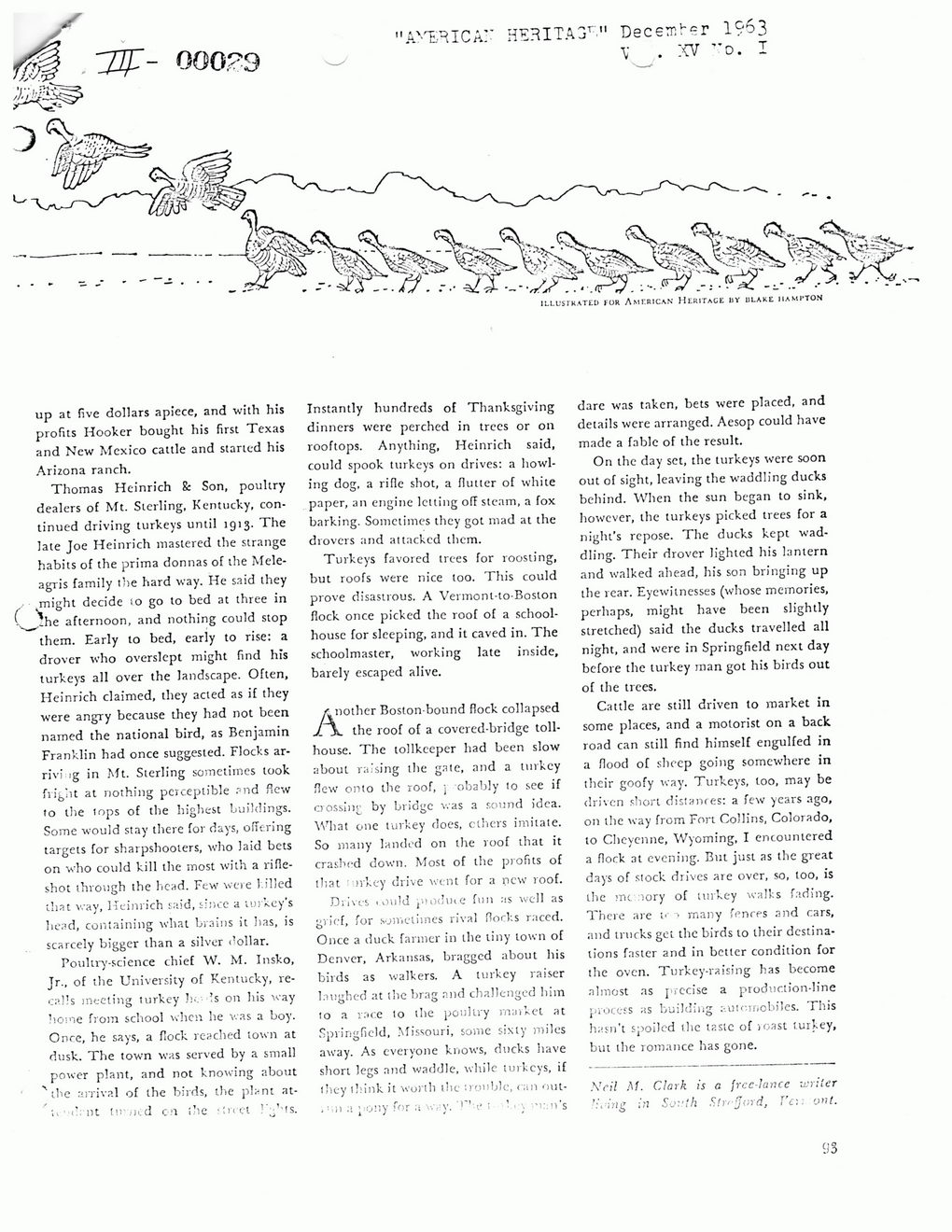This text was obtained via automated optical character recognition.
It has not been edited and may therefore contain several errors.
ILLUSTRATED TOR AMERICAN HERITAGE I3Y ULAKE IIAMJ'TON up at five dollars apiece, and with his profits Hooker bought his first Texas and New Mexico cattle and started his Arizona ranch. Thomas Heinrich & Son, poultry dealers of Mt. Sterling, Kentucky, continued driving turkeys until 1913. The late Joe Heinrich mastered the strange habits of the prima donnas of the Mele-agris family the hard way. He said they might decide to go to bed at three in C___^he afternoon, and nothing could stop them. Early to bed, early to rise: a drover who overslept might find his turkeys all over the landscape. Often, Heinrich claimed, they acted as if they were angry because they had not been named the national bird, as Benjamin Franklin had once suggested. Flocks arriving in Mt. Sterling sometimes look flight at nothing perceptible and flew to the tops of the highest buildings. Some would stay there for days, offering targets for sharpshooters, who laid bets on who could kill the most with a rifleshot through the head. Few were killed that v.av, Heinrich said, since a turkey's head, containing what brains it has, is scarcely bigger than a silver dollar. Poultry-science chief \V. M. Insko, Jr., of the University of Kentucky, recalls meeting turkey ’s on his way home from school when he was a boy. Once, he says, a flock reached town at dusk. The town was served by a small power plant, and not knowing about 'the arrival of the birds, the plant at-lit tIV iud on ihe :!i'< ct ! V’ls. Instantly hundreds of Thanksgiving dinners were perched in trees or on rooftops. Anything, Heinrich said, could spook turkeys on drives: a howling dog, a rifle shot, a flutter of white paper, an engine letting off steam, a fox barking. Sometimes they got mad at the drovers and attacked them. Turkeys favored trees for roosting, but roofs were nice too. This could prove disastrous. A Vermont-to-Boston flock once picked the roof of a school-house for sleeping, and it caved in. The schoolmaster, working late inside, barely escaped alive. r■ notlier Boston-bound flock collapsed J~\. the roof of a covered-bridge tollhouse. The tollkeeper had been slow about raising the gate, and a turkey flew onto the roof, j obably to see if crossing by bridge was a sound idea. VVliat one turkey does, ethers imitate. So many landed on the roof that it crashed down. Most of the profits of that "irkey drive went for a new roof. Drives lould j»odme fun as well as grief, for sometimes rival flocks raced. Once a duck farmer in the tiny town of Denver, Arkansas, bragged about his birds as walkers. A turkey raiser laughed at the brag and challenged him to a race to the poultry rnaiket at Springfield, Missouri, some sixty miles away. As everyone knows, ducks have short legs and waddle, while turkeys, if they think it worth the trouble, run out-a pony for a v.vv. T'-e ; -, -v.n’s dare was taken, bets were placed, and details were arranged. Aesop could have made a fable of the result. On the day set, the turkeys were soon out of sight, leaving the waddling ducks behind. When the sun began to sink, however, the turkeys picked trees for a night’s repose. The ducks kept waddling. Their drover lighted his lantern and walked ahead, his son bringing up the rear. Eyewitnesses (whose memories, perhaps, might have been slightly stretched) said the ducks travelled all night, and were in Springfield next day before the turkey man got his birds out of the trees. Cattle are still driven to market in some places, and a motorist on a back road can still find himself engulfed in a flood of sheep going somewhere in their goofy way. Turkeys, too, may be driven short distances: a few years ago, on the way from Fort Collins, Colorado, to Cheyenne, Wyoming, I encountered a flock at evening. But just as the great days of stock drives are over, so, too, is the mt.iory of turkey walks fading. There are !■ • many fences and cars, and trucks get the birds to their destinations faster and in better condition for the oven. Turkey-raising has become almost as precise a production-line jiioccfs as building Miw-mobiles. This I O hasn't spoiled (he taslc of ioast turkey, but the romance has gone. ,W;7 M. Clark is a frcc-Iance writer ’:\ing ill Sjrih Str'-Jard, I'c;: vnt. (J3

Coast General When-Turkeys-Walked-1963-(2)